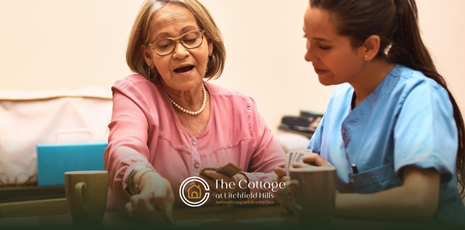Why Socialization Matters for Seniors

Key Highlights
- Socialization improves cognitive health, mood, and physical well-being in seniors.
- Isolation increases risks of depression, dementia, and chronic illness.
- Group activities, technology, and intergenerational connections help foster engagement.
- Caregivers and families play a vital role in encouraging participation and reducing barriers.
- Socially active seniors enjoy higher life satisfaction, resilience, and longevity.
As we age, maintaining meaningful connections becomes essential for overall health and well-being. Socialization is often underestimated, yet it plays a critical role in the mental, emotional, and physical health of seniors. For older adults, social engagement can reduce isolation, boost cognitive function, and even extend life expectancy.
In this article, we’ll explore why socialization matters for seniors, the risks of isolation, practical ways to stay connected, and strategies caregivers and family members can use to support social engagement.
The Importance of Socialization in Senior Health
Socialization is more than just spending time with others; it involves emotional connection, communication, and shared experiences. Research shows that seniors who remain socially active enjoy numerous benefits:
- Improved cognitive health: Engaging in conversations and activities stimulates the brain and may reduce the risk of dementia.
- Enhanced emotional well-being: Social interactions reduce feelings of loneliness, depression, and anxiety.
- Better physical health: Seniors who are socially engaged tend to stay more active, which benefits mobility, cardiovascular health, and immune function.
- Longer life expectancy: Studies suggest that strong social ties correlate with increased longevity and lower risk of chronic illness.
The Risks of Social Isolation
Isolation is a serious concern for seniors and can have profound health consequences. Seniors who lack social interaction are at higher risk for:
- Depression and anxiety: Loneliness can significantly impact mood and increase stress levels.
- Cognitive decline: Limited social engagement is linked to faster memory loss and a higher risk of Alzheimer’s disease.
- Physical health problems: Isolated seniors may experience higher blood pressure, weaker immune systems, and increased susceptibility to illness.
- Reduced quality of life: A lack of social connection can make daily life feel monotonous, lonely, and unfulfilling.
| Risk Factor | Impact on Seniors | Suggested Solution |
|---|---|---|
| Loneliness | Increased depression, anxiety, and stress | Encourage regular visits, phone calls, and social activities |
| Cognitive decline | Memory loss, reduced problem-solving abilities | Engage in brain-stimulating activities and conversations |
| Physical inactivity | Weakness, mobility issues, higher risk of chronic disease | Participate in group exercises, walks, or recreational activities |
| Reduced emotional support | Feeling disconnected from family and community | Foster meaningful connections through clubs, volunteer opportunities, or intergenerational programs |
How Socialization Benefits Mental Health
Maintaining social connections helps seniors stay mentally sharp and emotionally balanced. Specific benefits include:
- Memory and cognitive stimulation: Conversations, games, and problem-solving activities help maintain mental agility.
- Reduced stress and anxiety: Social interactions can buffer stress responses and improve mood.
- Sense of purpose: Participation in social groups or volunteer work gives seniors a feeling of belonging and contribution.
- Increased resilience: Strong social networks help seniors cope with life transitions, such as moving to assisted living or coping with health changes.
How Socialization Supports Physical Health
Social engagement also directly affects physical well-being:
- Active lifestyle: Group exercise classes or walking clubs encourage movement and mobility.
- Better nutrition: Shared meals often promote healthier eating habits and portion control.
- Reduced risk of chronic illness: Socially connected seniors tend to have lower blood pressure, healthier heart function, and improved immune responses.
- Health monitoring: Interacting with others increases the likelihood that warning signs of illness will be noticed and addressed promptly.
Practical Tips to Encourage Socialization
Fostering social engagement requires intentional effort, whether for seniors living independently, in assisted living, or in memory care communities. Here are effective strategies:
1. Create Opportunities for Connection
Organize group activities, clubs, and events that align with seniors’ interests, such as:
- Book clubs or discussion groups
- Arts and crafts sessions
- Music or dance classes
- Gardening or outdoor activities
- Cooking or baking clubs
2. Incorporate Technology
Virtual communication tools can help seniors stay in touch with family and friends, especially if mobility or distance is an issue:
- Video calls and messaging apps
- Online games or brain-training apps
- Social media or online community groups
3. Encourage Intergenerational Activities
Interactions with children or younger adults can be highly beneficial:
- Family visits and storytelling
- Volunteer programs involving youth or local schools
- Community mentorship opportunities
4. Promote Routine and Consistency
Scheduled social activities help seniors anticipate and look forward to interactions, creating a sense of structure and purpose.
5. Be Inclusive and Patient
Some seniors may feel shy or hesitant. Offer gentle encouragement, invite them to join small groups, and respect their comfort levels.
Overcoming Barriers to Socialization
Barriers to social engagement can include physical limitations, transportation challenges, or cognitive impairments. Solutions include:
- Transportation support: Arrange rides to social events or utilize community shuttle services.
- Adaptive activities: Modify activities for physical or cognitive abilities to ensure participation.
- Small group gatherings: Smaller, intimate settings may feel more comfortable than large events.
- Staff or volunteer support: Assisted living and memory care staff can facilitate social activities and provide encouragement.
Examples of Socialization Activities
| Activity | Benefits | Suggested Implementation |
|---|---|---|
| Group exercise | Promotes mobility, balance, and cardiovascular health | Schedule morning walks, yoga, or low-impact aerobics |
| Music therapy | Evokes memories, improves mood | Host sing-alongs, instrument sessions, or personalized playlists |
| Arts & crafts | Encourages creativity and cognitive stimulation | Weekly painting, knitting, or craft sessions |
| Games & puzzles | Cognitive engagement, social interaction | Chess, card games, or puzzle competitions |
| Storytelling & discussion groups | Emotional connection, memory recall | Encourage sharing life stories or discussing current events |
Role of Caregivers and Family Members
Family involvement is crucial in maintaining socialization for seniors. Caregivers can:
- Facilitate visits and encourage participation in social activities.
- Introduce new social opportunities or hobbies.
- Be patient and supportive when seniors are hesitant.
- Collaborate with senior living staff to create engaging, meaningful experiences.
Long-Term Impact of Socialization
Socially engaged seniors consistently report higher life satisfaction, reduced depressive symptoms, and better overall health outcomes. Communities that foster social connections create environments where seniors thrive physically, mentally, and emotionally.
Final Thoughts
Socialization is a cornerstone of senior health, affecting mental, emotional, and physical well-being. By prioritizing meaningful connections, seniors can experience improved cognitive function, reduced risk of depression, better physical health, and enhanced quality of life.
Communities like The Cottage at Litchfield Hills provide structured programs, engaging activities, and supportive environments designed to encourage social interaction and meaningful connections among residents, ensuring seniors remain connected, active, and fulfilled. Contact us today!
Frequently Asked Questions
How often should seniors participate in social activities?
Daily or multiple times per week is ideal, even if activities are short, to maintain engagement and prevent isolation.
What if my loved one is shy or hesitant to socialize?
Start with small groups or one-on-one interactions, and gently encourage participation without pressure.
Can technology replace in-person socialization?
While virtual communication is helpful, in-person interactions provide more emotional and cognitive benefits.
Are intergenerational activities beneficial?
Yes. Interacting with younger generations can boost mood, spark memories, and provide a sense of purpose.
What types of social activities are best for seniors with mobility limitations?
Adaptive activities such as chair exercises, crafts, music sessions, or small discussion groups can provide engagement without physical strain.
Sources:
- https://newsroom.clevelandclinic.org/2022/12/09/why-socialization-is-important-for-older-adults
- https://www.nhs.uk/mental-health/feelings-symptoms-behaviours/feelings-and-symptoms/loneliness-in-older-people/






